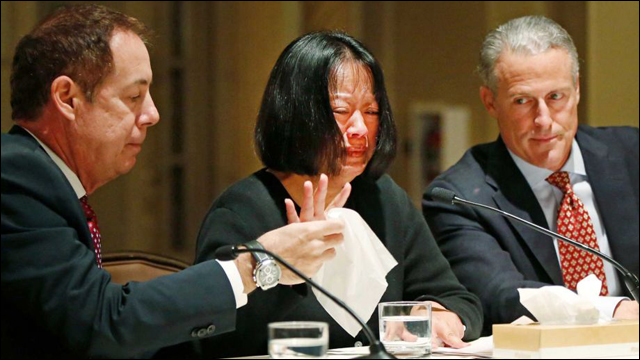
For weeks following the Isla Vista shooting, killer Elliot Rodger was described in mainstream media as a young White man. This was a convenient narrative: Rodger was seen as yet another example of the maligned young vengeance-seeking White male outcast (like Eric Harris and Dylan Klebold and Adam Lanza): so twisted by violent first-person shooters and sexual-social frustration that he resorted to unthinkable violence.
Yet, for Elliot Rodger, this narrative is complicated by Rodger’s own tangled and confusing relationship with his racial identity: one that defies simple categorization as Rodger being straightforwardly White, or otherwise.

Biologically speaking, Elliot Rodger was biracially White and Asian American. Rodger’s biological mother was Asian American, and in his lengthy manifesto, Rodger self-identified as a “beautiful Eurasian”. Upon his death, Rodger was initially identified by law enforcement as an unknown “Asian male”.
Elliot Rodger also viewed his mixed race heritage as elevating him above those he termed as “lowly” “full-blooded Asian” men. In a lengthy 68-page report released last month by the Santa Barbara sheriff’s department, it is revealed that Elliot Rodger frequently conducted Google searches on Adolf Hitler and Naziism. These search terms are consistent with Rodger’s frequent racist web postings that espouse a clear belief in a racial hierarchy which positioned men of colour as sexually and socially inferior to Whites, and which further positioned White women as the most-coveted.
In May of last year, Chauncey DeVega wrote a highly-shared piece for Alternet (“Yes, Elliot Rodger is ‘White’: What the Santa Barbara Shooter Can Teach Us About Race and Masculinity”), where DeVega argues that racial identity is predominantly a performance, and that Whiteness is the specific performance of superiority over other people of colour. Both DeVega and Philip of You Offend Me You Offend My Family reason that Rodger’s rejection of his Asianness coupled with internalization of White supremacy was evidence of his Whiteness.
Of course, on the merits, DeVega is correct: Elliot Rodger’s racial performance was one of asserted superiority and privilege over Asian American men and other men of colour. That same sheriff’s department report I cited earlier illustrates in gruesome detail Rodger’s murders of his Asian American suitemates — Weihan Wang and Chen Hong — as well as their friend George Chen: we now know that Rodger reserved his most horrific, intimate, and impassioned acts of violence for these three young Asian American men. Investigators believe that Rodger murdered Wang, Hong and Chen by ambushing them as they entered the shared suite one-at-a-time, stabbing each as many as 94 times around the head, neck and upper torso, and then dragging their bodies into back rooms for hiding. In his later spree through the streets of Isla Vista, Rodger randomly attacked pedestrians and cyclists with his car and legally-purchased guns, killing 3 and wounding 17 more individuals — including at least 4 additional Asian American men.
There can be no clearer evidence of Elliot Rodger’s performance of anti-Asian American hatred than this. There can be no weightier justification for our moral desire to punish Rodger for his unthinkable crimes against the Asian American male body by expelling him from the race than this.
Yet, I am nonetheless troubled by DeVega’s argument, and its consequent erasure of the complexity of Elliot Rodger’s racial identity. It would be far too simple to characterize Elliot Rodger as an updated “Tragic Mulatto“, yet this is what we accomplish when we force a definition of Rodger as either White or not; and more importantly, never possibly and simultaneously both.
I am troubled by our larger instinct to pass judgement with regard to Rodger’s racial identity based on Rodger’s demonstrated behaviours. When race is based predominantly on suitable racial performance, the question logically follows: who defines the parameters of this authentic (or inauthentic) performance? DeVega writes:
It is a performance which can be sincere, authentic, stereotypical, deviant, natural, subversive, grotesque, beautiful, or ugly
Yet, DeVega later argues that because Elliot Rodger’s performance was one of asserted superiority over people of colour, Rodger had therefore invested so heavily in the political project of Whiteness that he negated any possibly “authentic” or meaningful Asian American-ness of his “Eurasian” identity. So, even while the spectrum of authentic racial performances might be broad, it is still according to DeVega a finite spectrum. Rodger’s White supremacist ideals are deemed to undermine his Asian-ness, and therefore it is concluded that Rodger was White — or, at least, ‘White’.
I dismiss the assertion that Elliot Rodger’s race must be viewed through a binary lens. While I agree that Elliot Rodger was fully invested in his own Whiteness, I dismiss the assertion that this means that he could not also have been a man of colour. Much of what mixed race politics teaches us is that racial identity is not zero-sum, and that mixed race people can be fully members of multiple races. All evidence points to the likelihood that Rodger self-identified as biracially Asian American (and not simply as White); although he hated “full-blooded” Asians, it is less clear what Rodger thought of his own status as a biracial man, and specifically whether this was a point of pride or shame (or both) for him. Either way, rather than to singlehandedly cast Rodger from POC status, we might instead ask ourselves: what if Elliot Rodger might also have been part of diasporic Asian America?
It is obviously disquieting to “claim” Elliot Rodger as possibly Asian American. His actions — particularly his violence against women, Asian American men, and all other marginalized people — make him a loathsome individual with whom no one should want to associate. Furthermore — and I cannot make this point any clearer — Elliot Rodger’s violence and misanthropy would be an outlier within Asian America, and Elliot Rodger is in no way representative of Asian American men.
It is therefore tempting to expel someone like Elliot Rodger from the race for his performance of White supremacy and self-hatred. I would love to be able to do so. If we grant this as a possibility, however, I fear we actually grant some among us the power to revoke the “race card” of others based on unsatisfactory (or inconvenient) racial performance. We reinforce an age-old system of racial identity gatekeepers where one’s race is not primarily based upon self-definition, but instead externally named according to “acceptable” demonstrations of racial pride and performance.
Rarely have racial identity gatekeepers wielded this power in pursuit of equality and inclusiveness within communities of colour. More typically, this power has been used as a form of public shaming. At various times in our history, we have passed judgement on the conservative of colour, the White-passing biracial, the code-switcher, and even LGBTQ individuals for failing to exhibit sufficient racial pride, or refusing to comply with the racial norms of their eras. In the Asian American community, Asian American feminists frequently contend with accusations of being racially inauthentic, based solely on political resistance towards our feminism. More recently, Asian American supporters of the Black solidarity movement are being labelled as “race traitors” for supporting the indictment of NYPD Officer Peter Liang in the shooting death of Akai Gurley. In short, when racial identification depends upon certain hallmarks of “acceptable” pride and performance, nothing protects the progressive, non-conforming radical from the arbitrary, capricious, sometimes malicious race gatekeepers who weaponize racial identification to police group difference. Too often, we would rather revoke the “race card” than engage the difficult conversation.
Here, we may ask: if cultural investment in Whiteness inauthenticates Asian American identity, then what meaning is there to having a conversation over Asian American reinforcement of institutionalized anti-Blackness? Why consider the impact of internalized racial self-hate on men and women of colour? Why prompt a much-needed conversation about toxic White misogyny, masculinity and misogylinity as it impacts men of colour? If Bobby Jindal’s bizarre indifference toward his skin colour indicates a similar investment in the political project of Whiteness, why even bother having a conversation on anti-Asian colorism and skin privilege within our community? Why not just exile these troublesome Asian Americans from the race?
Elliot Rodger self-identified as biracial; yet, he desired Whiteness. The only fair conclusion we can draw from this is that his relationship with his own race was complex. Ultimately, none of us can know or decide the full extent of Elliot Rodger’s claimed racial identity — whether White or Asian American or both or neither. We have only shadowy hints that encourage us to project our biases onto that relationship.
What we do know is that Elliot Rodger committed unspeakable, horrific and racist violence against at least seven of my fellow Asian American men, and that this violence should be neither understated nor ignored. Last week, the families of Weihan Wang, Chen Hong and George Chen filed a lawsuit against the property management company that placed Rodger in the same suite as Wang and Hong, and against Santa Barbara County for failing to recognize in their multiple encounters with Rodger the “red flags” that he was dangerous.
Elliot Rodger wanted nothing more in his life than to be viewed as fully — and solely — White. I cannot imagine a greater injustice to his victims than to unanimously grant Rodger in death that which he so deeply coveted in life: undeniable Whiteness.
